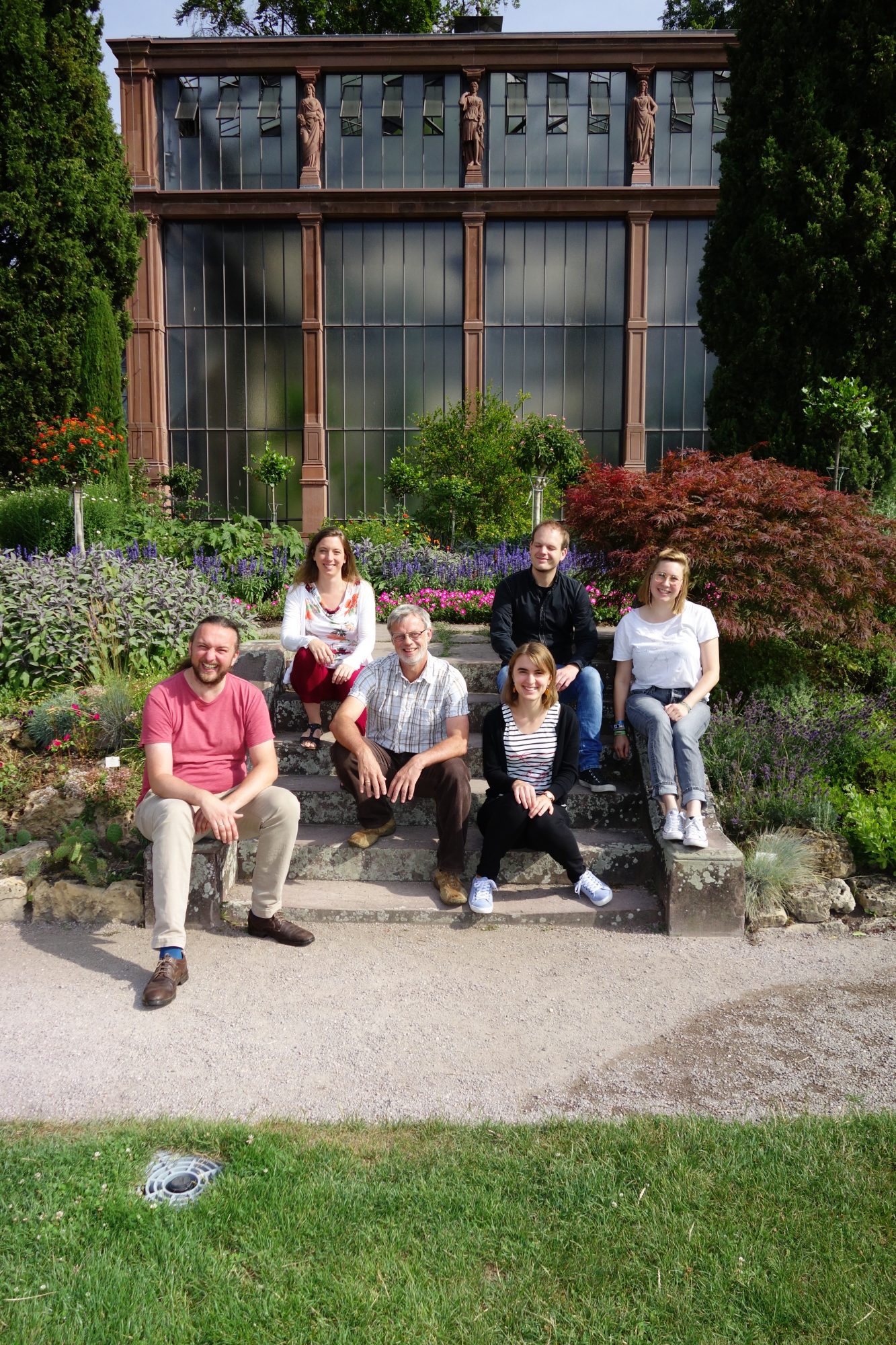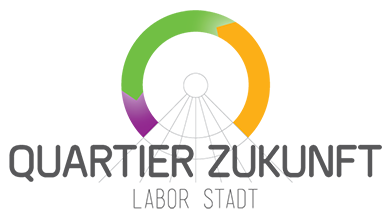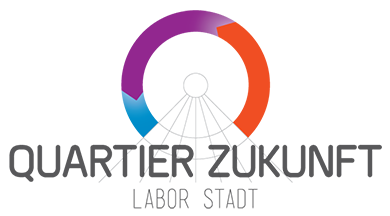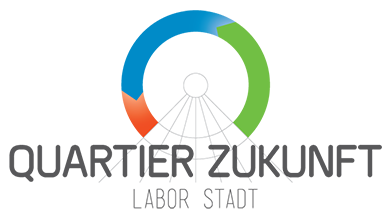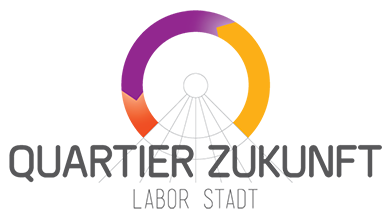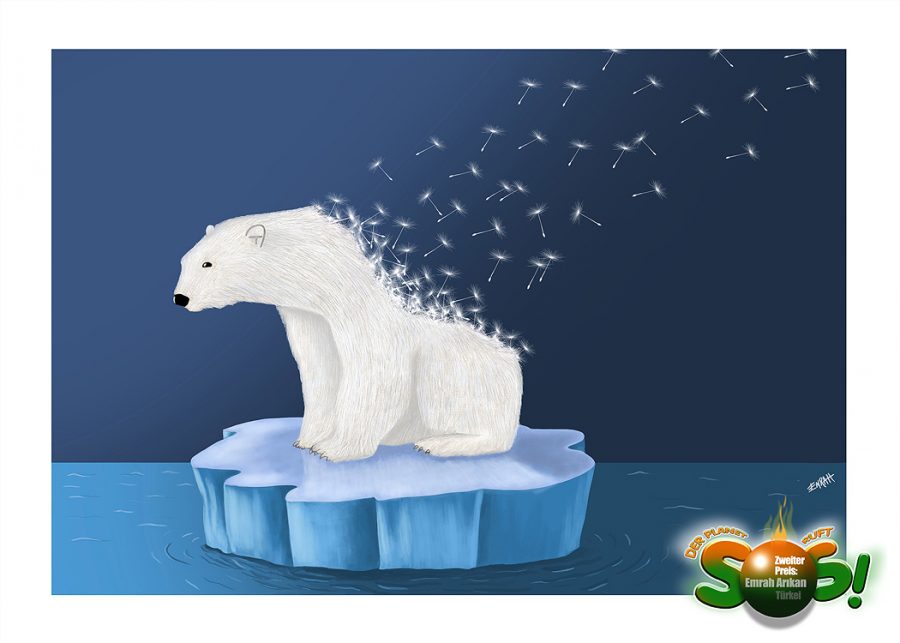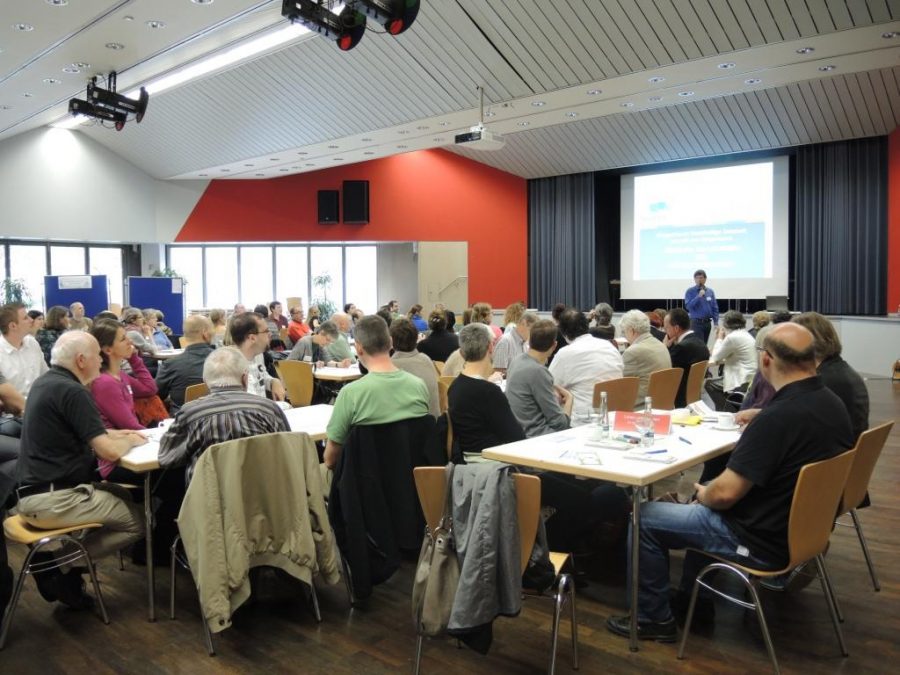Imprint and Privacy Policy
The project "District Future" is a project of Karlsruhe Institute for Technology.
Service provider according to § 5 of the German Telemedia Act
Karlsruhe Institute for Technology
Kaiserstraße 12
76131 Karlsruhe
Germany
Tel.: +49 721 608-0
Fax: +49 721 608-44290
E-Mail: info@kit.edu
Legal Form: Corporation governed by public law
Authorized Representatives: Prof. Dr. Holger Hanselka (President of KIT)
Turnover Tax Identification Number: DE266749428
Responsible for the content according to § 55 of the German Interstate
Broadcasting Agreement:
Dr. Oliver Parodi
Karlsruhe Institute for Technology
Institute for Technology Assessment and Systems Analysis
Karlstraße 11
76133 Karlsruhe
E-mail: oliver.parodi@kit.edu
Editorial responsibility
Alexandra Quint
Karlsruhe Institute for Technology
Institute for Technology Assessment and Systems Analysis
Karlstraße 11
76133 Karlsruhe
E-mail: alexandra.quint@kit.edu
Copyright
For the internet pages of Karlsruhe Institute of Technology, the copyright and all other
rights lie with the Karlsruhe Institute of Technology, Kaiserstraße 12, 76131 Karlsruhe,
Germany. This also applies to the website of the project District Future. Further
dissemination, also in parts, for pedagogic, scientific or private purposes is allowed,
provided that the source is indicated (unless otherwise expressly stated on the
respective page). Use for commercial purposes shall require the approval by the
Karlsruhe Institute of Technology. Contact the Public Relations and Marketing
Department.
Disclaimer for contents of site
These internet pages serve for information only. Their contents were compiled with due
diligence. However, Karlsruhe Institute of Technology shall not assume any liability,
neither expressly nor implied, for the type, correctness, completeness and topicality of
the material offered and shall not be liable (including liability for indirect loss or loss of
profit) for the material or use of this material. In case contents of websites of the
Karlsruhe Institute of Technology violate valid legal regulations, we kindly ask you to
inform us immediately. We will then remove the site or the respective contents
immediately.
Image rights
The service provider has to its best knowledge applied for all rights of use for the
photographs, graphics, sound documents and video sequences displayed on this site.
Any person who feels his or her rights have been violated is kindly asked to contact the
Karlsruhe Institute of Technology in order to resolve the matter.
Disclaimer for External Websites
The websites of Karlsruhe Institute of Technology contain links to information offered by
servers which are not subject to the control and responsibility of the Karlsruhe Institute of
Technology. Karlsruhe Institute of Technology shall not assume any responsibility or
guarantee for this information and shall not approve of or support such information in
terms of contents.
Privacy Policy
Information on the Collection of Personal Data
The operators of these websites take the protection of your personal data very seriously.
Personal data are all data that can be related to you personally, such as name, address, email addresses, and user behavior (information referring to an identifiable natural person (Art. 4, No. 1 of the EU General Data Protection Regulation (GDPR))).
Controller according to Art. 4, par. 7 GDPR is the President of KIT, Professor Dr.-Ing. Holger Hanselka, Kaiserstrasse 12, 76131 Karlsruhe, Germany, info@kit.edu (see Legals). Our
Data Protection Commissioner can be contacted at datenschutzbeauftragter@kit.edu or by ordinary mail with “Die Datenschutzbeauftragte” (the data protection commissioner) being indicated on the envelope.
When you
contact us by electronic mail or via a contact form, the data given by you (your email address and, if applicable, your name and your phone number) will be stored by us to answer your questions. The data arising in this connection will be erased as soon as storage will no longer be required or processing will be restricted, if legal obligations to retain the data exist.
We would like you to note that
internet-based data transmission (e.g. when communicating by electronic mail) may have security gaps. Absolute protection of data against access by third parties may not be guaranteed.
Collection of Personal Data
When
using the website for information purposes only, we will only collect the personal data that are transmitted by your browser to our server according to the settings made by you (server log files). For viewing our website, we collect the data required for this purpose and needed for ensuring stability and security according to Art. 6, par. 1, clause 1, (f) GDPR:
Anonymized IP address, Date and time of access, Time zone difference to Greenwich Mean Time (GMT), Content of the access (concrete site), Status of access/HTTP status code, Data volume transmitted, Website from which an accessing system reaches our website, Browser
These data
cannot be referred to certain persons. These data will not be combined with other data sources. We reserve the right to check these data later on, if concrete indications of unlawful use become known to us.
SSL Encryption
For reasons of security and for the protection of the transmission of confidential contents, such as inquiries sent to us as website operator, this website uses SSL encryption. In case of an encrypted connection, the address line of the browser changes from http:// to https:// and the lock symbol is indicated in your browser line.
When SSL encryption is activated, third parties cannot read the data you transmit to us as a rule.
Your Rights
As far as your personal data stored by us are concerned, you have the following rights:
Right of access, Right to rectification or erasure, Right to restriction of processing, Right to object to data processing, Right to data portability.
In addition, you have the right to complain about the processing of your personal data by us with a supervisory authority.
In the case of manifestly unfounded or excessive requests, we can charge a reasonable fee. Otherwise, information will be provided free of charge (Article 12, par. 5 GDPR).
In the case of reasonable doubts concerning the identity of the natural person asserting the above rights, we may request the provision of additional information necessary to confirm the identity of the data subject (Article 12, par. 6 GDPR).
Cookies
In addition to the data mentioned above, cookies are stored on your personal computer when using our website. Cookies are small text files stored in your computer system by the browser used by you, through which we (the server of our website) obtain certain information. Cookies cannot execute any programs or transmit viruses to your computer. They serve to make internet offers more user-friendly, more effective, and quicker. It is distinguished between session cookies (transient cookies) and permanent (persistent) cookies.
Transient cookies are deleted automatically when you close the browser. They include in particular the session cookies. These store a so-called session ID, through which queries of your browser can be allocated to the joint session. They allow us to identify your computer when you return to our website. Session cookies are deleted when you log out or close the browser.
We use session cookies exclusively. We do not use any persistent cookies or flash cookies.
You can set your browser such that you will be informed about the setting of cookies and you can permit cookies in individual cases only, exclude the acceptance of cookies in certain cases or in general, and activate automatic deletion of cookies when closing your browser. When deactivating cookies, functionality of this website may be limited.
Newsletter and MailChimp
If you would like to subscribe to the newsletter offered on this website, we require an e-mail address from you as well as information that allows us to verify that you are the owner of the email address provided and that you agree to receive the newsletter. The data entered in the newsletter registration form will be processed exclusively on the basis of your consent (Art. 6 para. 1 lit. a DSGVO). You can revoke your consent to the storage of the data, the e-mail address and its use for sending the newsletter at any time, for example via the "unsubscribe" link in the newsletter. The legality of the data processing processes already carried out remains unaffected by the revocation.
We use the online service MailChimp for sign up and email delivery. Mailchimp is offered by the company Rocket Science Group, 675 Ponce de Leon Ave NE, Suite 5000, Atlanta, GA 30308, USA. The Rocket Science Group LLC d/b/a MailChimp is certified by the Privacy Shield Framework and thereby guarantees to adhere to the European data protection level (
https://www.privacyshield.gov/participant?id=a2zt0000000TO6hAAG&status=Active). If you sign up for a newsletter, your name and email address are saved by MailChimp and used to send the newsletter to the email address you provided. In addition, MailChimp also collects the following information: if and when you open a newsletter, if you click the links in a newsletter, your IP address, the browser or email program you are using, and other details of this sort. MailChimp uses single-pixel GIFs (also known as web beacons) in newsletter emails to collect this information. We can view this information in the online service's interface. The legal basis for the use of your data is your click on the confirmation link for the newsletter you signed up for. You can cancel the newsletter at any time and in this way take back the use of your data. MailChimp's privacy policy can be found at
http://mailchimp.com/legal/privacy/.
Comments
For the comments function on this website, apart from your comment, information on the time of the creation of your comment, your email address and the username you choose will be stored. User name, date and comment are visible on the website. The comments and the connected data (e.g. IP address) will be stored and stay on our website until the commented content has been deleted completely or if the comments have to be deleted for legal reasons (e.g. insulting comments). The storage of comments is processed exclusively on the basis of your consent (Art. 6 Paragraph 1 GDPR). The legality of the data processing processes carried out up to the revocation remains unaffected by the revocation.
Social media plugins using the '2Click' solution
On our website, so-called 'social plugins' ('plugins') from the social media networks Facebook and Google+ and the microblogging service Twitter are used. The companies Facebook Inc., Google Inc. and Twitter Inc. provide these services (‘providers’). Facebook is operated by Facebook Inc. (1601 S. California Ave, Palo Alto, CA 94304, USA),hereinafter 'Facebook'. An overview of the plugins from Facebook and what they look like can be found here:
https://developers.facebook.com/docs/plugins
Google+ is operated by Google Inc. (1600 Amphitheatre Parkway, Mountain View, CA 94043, USA),hereinafter 'Google'. An overview of the plugins from Google and what they look like can be found here:
https://developers.google.com/+/web/
Twitter is operated by Twitter Inc. (1355 Market St, Suite 900, San Francisco, CA 94103),hereinafter 'Twitter'. An overview of the Twitter buttons and what they look like can be found here:
https://about.twitter.com/en_us/company/brand-resources.html
To increase the protection of your data during your visit to our website, the plugins are integrated into the site by means of a so-called '2Click' solution. This integration ensures that no connection is established at first with the servers of Facebook, Google and Twitter when you open a page on our website that contains such plugins. Only when you activate the plugins and grant your consent to transfer data, your browser will establish a direct connection with the Facebook, Google and Twitter servers. The content of each plugin is then transferred directly to your browser and integrated into the page. By integrating plugins, the providers receive the information that your browser has opened the specific page on our website, even if you do not have an account of the provider or are logged out of your account at that time. This information (including your IP address) is transferred by your browser to a Twitter server in the USA and stored there.
If you are logged in into one of the social networks, the provider can connect the visit of our website to your facebook or Google+ account directly. Whenever you use the plugins (for example, by clicking the 'Like' button, the '+1' button or the 'tweet' button), the information in question is also transferred directly to a Twitter server and stored there. Furthermore, the information is published on the social network or Twitter and visible to your contacts there. The purpose and scope of the data collection and further processing and use of the data by the providers, as well as your rights and options for privacy protection settings can be found in their privacy policies.
Privacy Policy of Facebook:
https://www.facebook.com/policy.php
Privacy Policy of Google:
http://www.google.com/intl/de/+/policy/+1button.html
Privacy Policy of Twitter:
https://twitter.com/de/privacy
Vimeo
Our website uses plugins operated by Vimeo. The owner of the site is Vimeo Inc., 555 West 18th Street, New York, New York 10011, USA. When you visit one of our webpages that is fitted with a Vimeo plugin, a connection will be established to Vimeo’s server. The Vimeo server will then be informed about which of our webpages you have visited. Moreover, Vimeo will be informed about your IP-address. This also happens if you are logged out of your Vimeo account at the time or if you do not have a Vimeo account. If you are logged into your Vimeo account, you enable Vimeo to match your activities with your personal profile. You can prevent this by logging out of your account. We use Vimeo in the interest of making our online offerings more appealing. This represents a legitimate interest as described in Art. 6 Paragraph 1 GDPR. More information on how Vimeo handles user data can be found in Vimeo’s privacy policy:
https://vimeo.com/privacy.
Open Street Map
We used maps of the service “OpenStreetMap” (
https://www.openstreetmap.org), which are provided on the basis of the Open Data Commons Open Database Lizenz (ODbL) by the OpenStreetMap Foundation (OSMF). Information on how Vimeo handles user data can be found in Vimeo’s privacy policy:
https://wiki.openstreetmap.org/wiki/Privacy_Policy.
Matomo (Piwik)
We have a legitimate interest (i.e. an interest in the analysis and optimisation of our website within the meaning of Article 6 (1f) GDPR) in the use of Matomo (Piwik), software designed to statistically evaluate user access. Your IP address is shortened before it is saved. Matomo uses cookies that are saved on the users' computers and make it possible to analyse use of this online service by the users. Pseudonymous use profiles may be created for the users during this. The information generated by the cookie about your use of this online service is stored on our server and not forwarded to third parties. You can opt out of this data processing as follows:


